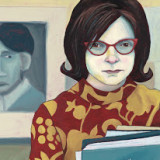
Utterly Heartless by Jan Underwood
Positives
Negatives
The town of Bridges, the fictional Pacific Northwest setting of Utterly Heartless, is a bizarre place. The winter rains fall so heavily that streets become canals; entire murders of crows descend upon the town regularly; intoxicatingly scented flowers periodically cause “blossom days,” during which school and businesses shut down because no one can go outside without getting drunk. The town’s centerpiece is Middlebridge College, where best friends and language department chairs Dori Amore and Linnea Nil share an office and keep each other going throughout battles with deans, faculty dramas, and poorly written student papers. It’s against this dreary background that a terrible crime occurs: Linnea is brutally murdered on campus, her heart cut out of her body and left in a sink in a women’s restroom. That setup might make Utterly Heartless seem akin to a buzzy Scandinavian crime thriller, but it’s actually something rarer and more exciting: a delightfully offbeat academic mystery that offers genuine emotion alongside sharp, witty satire.

Crows are everywhere in Middlebridge, but it’s hard to tell: are they friend or foe?
Image credit: Danny Chapman via Creative Commons
In her second novel—the first, Day Shift Werewolf, won the 28th annual International 3-Day Novel Contest in 2005—Jan Underwood focuses on the interconnected experiences of three women at Middlebridge: Linnea, Dori, and a sophomore Classics major named Alice. Linnea is dead—without any memory of the murder—but not at peace. She’s been tasked with figuring out how to get into a decent afterlife, and she has two weeks in which to linger around Bridges and sort out her dilemma, with only the ancient, benevolent poet Vergil to help her out (when he’s not struggling to overcome his writer’s block and finish the Aeneid, that is). Dori is bereft, missing Linnea and overburdened at work, where the menacing Dean Fiercey’s budget cuts threaten to make life even worse for Middlebridge’s beleaguered faculty and students. Alice is barely scraping together enough money to stay in school, and now that her beloved Latin professor is dead, she’s not even sure that Middlebridge is worth the hours she puts in scrounging tips as a dancer at a local strip club. And there’s one thing they’re all wondering: why would anyone want to kill Linnea? The narrative cuts back and forth between these three main characters, whose tribulations slowly converge as the story moves forward.
The murder mystery aspect of the plot is engaging enough, but is perhaps this book’s weakest link. The suspects and motives are fairly straightforward, and the denouement is only mildly surprising. But in every other way, Utterly Heartless bursts with originality. Middlebridge and its denizens teeter right on the brink of reality—they’re a surrealist interpretation of any liberal arts college, grounded in believability but just twisted enough to make for truly delicious satire. Alice and her friends are absurd caricatures of broke college students—one roommate schedules surrogate motherhood to coincide with her tuition payments, while another is constantly undergoing a barrage of drugs trials for pay—but their personalities and emotions ring completely true. Similarly, the nefarious antics of budget-slashing Dean Fiercey are both ridiculously over-the-top and completely familiar to anyone involved in higher education. As a parody of academia and its many foibles, Utterly Heartless sings.
Underwood extends the theme of overgrown bureaucracy to the unreligious Linnea’s exploration of various afterlives. Initially, her studies of ancient Roman culture get her condemned to Hades, to which she protests: “I have to spend eternity in Hades on the basis of two essays I published in the Antiquities Studies Journal?” In return, she’s told: “You haven’t given us anything else to work with.” Linnea’s ensuing search for a better option—which, it eventually transpires, will require her dear friend Dori to somehow recover Linnea’s missing heart—is both hilarious and thought-provoking. Which aspects of our lives truly define who we are? How do we know what we deserve, and how can we prove it? Utterly Heartless’s exploration of these questions is both tender and irreverent, and Underwood’s insights on the subject of spirituality are as piercing as the ones she offers into academia. Considering the state of her soul, Linnea contemplates that, for the forces governing the afterlives, there is “probably no record…of Linnea’s stellar student evaluations [and] excellent annual performance reviews.”
For all its cleverness, however, Utterly Heartless’s greatest strength is its characters. Their milieu may be outlandish, but they themselves are wholly human and sympathetic. Alice’s process of figuring out the value of her youthful ideals is consistently poignant, and Linnea’s growing suspicion that her living years were misspent is downright heartbreaking at times. Of the three, Dori is perhaps the most fully rounded character; her attempts to balance and understand the conflicting demands of her scattered life will be recognizable to just about anyone. Upon learning something new about the man she’s been dating, Dori thinks: “But the best part was that he had a flaw! He had a flaw! He had a weirdness, an irrational, incurable something that sometimes bothered other people, and he knew it…If he had a flaw, it meant it was probably okay for Dori to be a little flawed, too.” Such vividly drawn emotional lives give each character—even more minor ones—depth and meaning, and make it easy to buy into the outwardly absurd storyline.
Utterly Heartless is undoubtedly a great read for classics buffs, for academics, and for mystery lovers, but it’s also sure to please any reader who just wants an innovative story and characters with, yes, heart.

